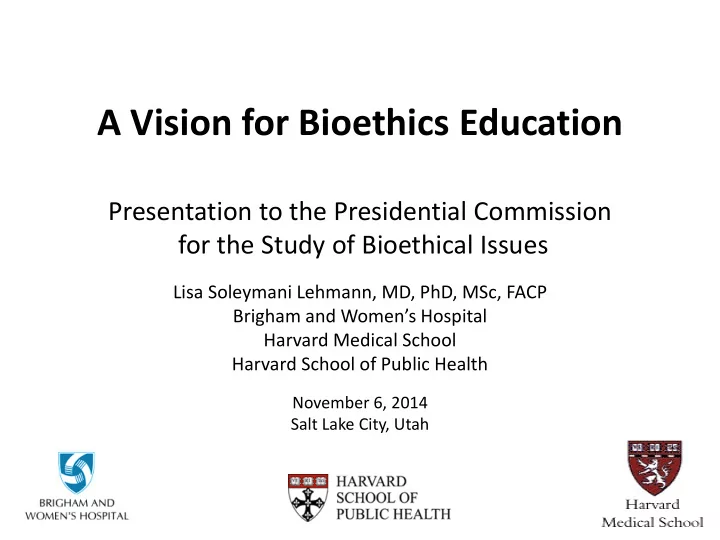

A Vision for Bioethics Education Presentation to the Presidential Commission for the Study of Bioethical Issues Lisa Soleymani Lehmann, MD, PhD, MSc, FACP Brigham and Women’s Hospital Harvard Medical School Harvard School of Public Health November 6, 2014 Salt Lake City, Utah
Goals of Bioethics Education • Improve the care of patients • Develop critical thinking & ethical deliberation – Improve moral reasoning – Increase ability to identify ethical issues – Insight into learners own values – Appreciate the pluralism of perspectives – Facilitates decision making • Cultivate of professionalism – Improve physician behavior • Develop practical skills – Communication skills, shared decision making, informed consent, giving bad news, advance care planning & disclosure of medical errors
Professionalism as a Core Competency • Personal qualities beyond knowledge and skills necessary to deliver high-quality care – Altruism, integrity, accountability, transparency, respect, compassion, promotion of the pubic good, commitment to excellence and lifelong learning • Dynamic concept that evolves as the practice of medicine changes • Instilled through active learning, role modeling, reflection, self-assessment & institutional culture
Why Cultivate Professionalism? • Most complaints against physicians relate to unprofessional behavior – Not lack of knowledge or poor technical skill (Papadakis Acad Med 1999, NEJM 2005, Ann Int Med 2008) • Opportunity to shape students’ moral development – Evidence of erosion of professionalism during clinical years (Feudtner Acad Med 1994, Wolf Med Educ 1989) • Forms the basis of a social contract between physicians and society (Cruess 2006)
Bioethics Education & Moral Courage • The courage to do what is right for patients despite potential risks – Alienating oneself from the team – Negative evaluations & recommendations – Conflict with the law • Critical thinking & internalization of professional values may lead to greater moral courage • Students who have considered ethical questions & the goals of medicine will be better prepared to make good ethical decisions and justify their reasons for acting
A Role for the Humanities • A deep understanding of illness and suffering will influence students’ attitudes and behaviors • As a result they will become more self-aware and will provide better health care to patients – See patients as individuals with a shared humanity • Fosters curiosity & enhances empathy • Tolerance for ambiguity • Improves observational and descriptive abilities • Personal rejuvenation • Redirects our focus to ultimate ends of medicine – Improve physical, mental & social well-being of patients
Reach of Bioethics Education • Citizens – Health care is important to all members of society – Organ donation, end of life care, use of assisted reproductive technology, disclosure of genetic information • Health care professionals – Informed consent, advance care planning, disclosure of medical errors • Public health professionals – Quarantine, resource allocation, personal responsibility for health • Scientists – Ethical and social implications of research, scientific misconduct
Public Ethical Deliberation • Questions of bioethics are questions for society – Physicians contribute medical expertise – Citizens share their values • Public deliberation encourages everyone to justify their perspective by providing reasons – Group deliberation help clarify values & inform choices • In clinical encounters, within the realm of societal norms, patients are the primary decision makers • In public policy, members of society need to be engaged in the process of public deliberation to achieve a moral consensus
Challenges • Difficult to engage people in ethical deliberation • Time in curriculum for bioethics & humanities – Skill development is time consuming • Faculty development • Culture of teaching hospitals – The hidden curriculum & medical hierarchy • Insufficient research connecting education to patient outcomes
Strategies for Enhancing Ethics Education • Ethics in high school and college • Development of model curricula – Medical school, residency & continuing medical education – Integrated into clinical settings – Relevant to learners – Interprofessional – Iterative and dynamic – Critical thinking – Internalization of professional values – Skill development
Strategies for Ethics Education • Creative educational methods – Active learning – Simulation based education • Increased funding for ethics education research – Longitudinal studies along continuum of education – Studies of relationship between curricula & patient outcomes • Forums for public deliberation on bioethical issues
Summary • Bioethics and humanities education are the gateway to the ethical practice of medicine and improved patient care – Need for model curricula at all levels of education • Cognitive, affective & skill development – Leadership support – Faculty development • Research on ethics education & patient outcomes • Infrastructure for public engagement in bioethics deliberation
The Need for Bioethics Education • Constant flow of new ethical questions in medicine – Should physicians comply with a law that prevents them from discussing guns, when doing so is not in the best interest of our patients or the public health? – Should physicians discuss the cost of tests and procedures with patients? – Should there be age limits for access to IVF? – Should parents have access to their children’s adult onset genetic predispositions? – Should we quarantine health care workers who have cared for Ebola patients? – Should we impose paternalistic public health policies to curb the obesity epidemic? – Should insurers cover fertility preservation for healthy women?
Ethics & Clinical Outcomes • High empathy scores correlated with good control of HbA1c and LDL in diabetic patients (Hojat Acad Med 2011) • Exposure to negative role models associated with increased unprofessional behavior (Martinez Acad Med 2014)
Recommend
More recommend